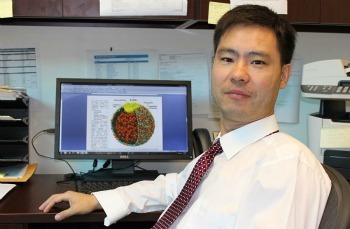
Deliang Guo
Assistant Professor
Department of Radiation Oncology
Ohio State University Medical Center
Research Summary
Metabolism reprogramming is the hallmark of cancer. Addictive glycolysis and exacerbated lipogenesis provide the advantage for tumor malignant growth. Recently, glutamine metabolism has also been revealed to contribute carbon for TCA cycle and lipid synthesis. However, how cancer cells balance energy production and macromolecular synthesis through orchestra glucose, glutamine metabolism and lipogenesis is unclear. Dr. Guo’s lab recently revealed SREBP-1, a master transcription factor to control fatty acid synthesis pathway, mediates PI3K/Akt signaling-drived glucose and Myc-drived glutamine metabolism to lipid synthesis, further demonstrate SREBP-1 is a good molecular target to treat cancer. Recently, they further discovered cancer cells import a large amount of cholesterol to support its malignant growth through upregulation of LDLR, and this process is directly regulated by PI3K/Akt/SREBP-1 pathway. Dr. Guo’s lab’s long term goal is to determine the key molecular targets in cancer metabolism and translate it to clinic.
The lab’s detailed research interests are to:
1) Investigate the molecular link between oncogenic signaling PI3K/Akt and Ras/MEK/ERK signaling with cancer metabolism.
2) Develop the strategy via targeting SREBP-1 to treat cancer.
3) Dissect cholesterol metabolism and its intersection with oncogenic signaling.
4) Delineate the relationship between autophagy and cancer metabolism, and determine the metabolomics profile in cancer.
5) Define lipid droplet role and its dynamic regulation in cancer and reveal its relationship with autophagy and cancer metabolism.
Originally published at harpercancer.nd.edu.